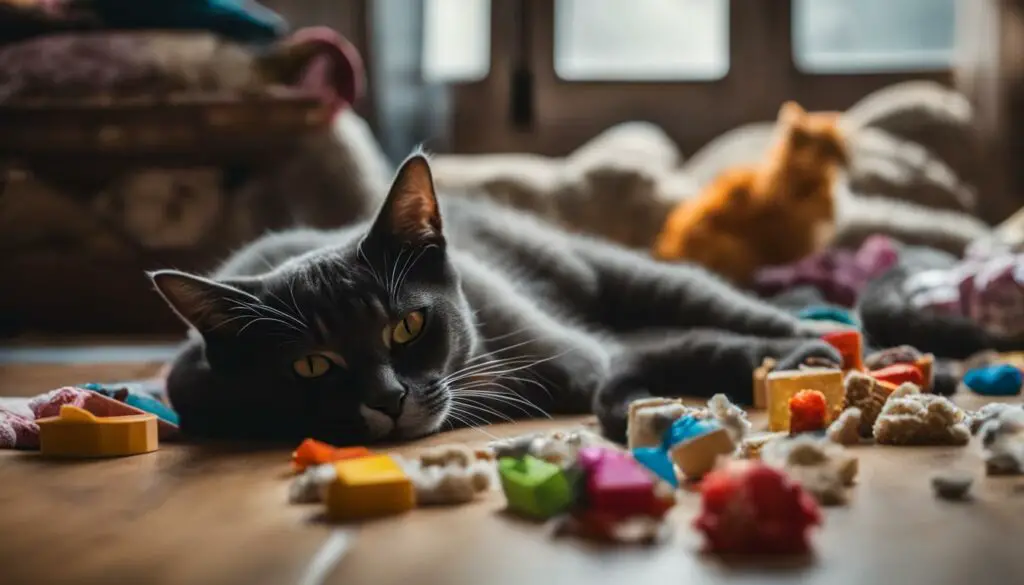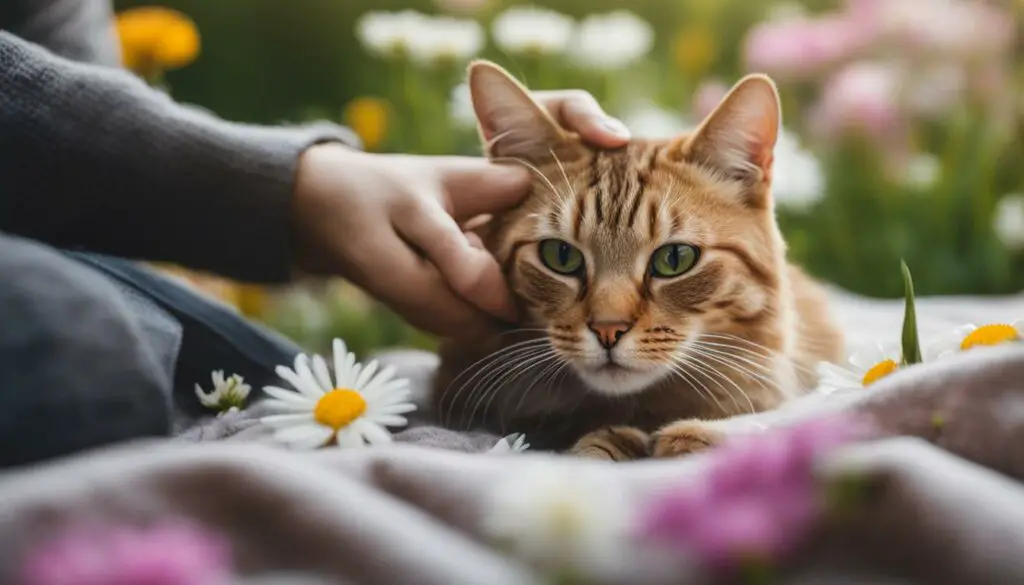Euthanasia is a compassionate end to suffering for cats. When faced with the difficult decision to euthanize a beloved pet, it’s important to know your options. Finding a place where you can euthanize your cat for free can provide peace of mind during this challenging time.
Veterinary hospitals and mobile veterinarians offer euthanasia services, either at the hospital or in the comfort of the cat’s home. These professionals follow guidelines set by the American Veterinary Medical Association (AVMA), ensuring that the procedure is standardized and performed with care and compassion.
Key Takeaways:
- There are options for euthanizing a cat for free.
- Veterinary hospitals and mobile veterinarians provide euthanasia services.
- The procedure follows guidelines set by the AVMA.
- Euthanizing a cat is a compassionate end to their suffering.
- Choosing the right place for euthanasia is crucial for both the cat and the owner.
Recognizing the Need for Euthanasia in Cats
Knowing when to euthanize a cat is a difficult decision that requires careful observation and consideration of their quality of life. Cats may exhibit various signs that indicate their suffering and indicate that euthanasia should be considered. Common signs include:
- Difficulty with mobility, such as struggling to walk or climb stairs
- Inability to use the litter box properly
- Loss of appetite and weight loss
- Chronic pain, indicated by panting, vocalizing, or changes in behavior
- Severe and incurable medical conditions
It is essential for cat owners to closely monitor their pet’s behavior and consult with a veterinarian for a professional assessment. They can evaluate the cat’s overall quality of life and help determine if euthanasia is the most compassionate choice.
“The silence of a cat can mean many things – especially if it’s not their usual behavior.”

Recognizing the Need for Euthanasia in Cats
Cats may experience a decline in their physical and mental well-being, which can significantly impact their quality of life. As responsible pet owners, it is our duty to be aware of the signs and provide the necessary care and support. Consulting with a veterinarian can help in making the challenging decision of when to euthanize a cat.
| Signs of Need for Euthanasia | What It Indicates |
|---|---|
| Loss of appetite and weight loss | Possible underlying illness or discomfort |
| Difficulty with mobility | Physical pain or deteriorating health conditions |
| Inability to use the litter box | Loss of control, potential urinary issues |
| Chronic pain and suffering | Diminished quality of life |
| Severe medical conditions | No viable treatment options to alleviate pain or prolong life |
Recognizing these signs and having open communication with a veterinarian will enable you to make the most compassionate decision for your beloved feline companion.
Choosing a Veterinarian for Euthanasia
When it comes to making the difficult decision to euthanize a cat, choosing the right veterinarian is crucial. Whether you opt for a veterinary clinic or a mobile veterinarian who provides in-home services, finding a compassionate and experienced professional is essential for a smooth and respectful euthanasia procedure.
The Benefits of a Veterinary Clinic
A veterinary clinic offers a controlled environment with all the necessary equipment and resources to perform euthanasia procedures. This setting provides a sense of professionalism and expertise, ensuring that the procedure is carried out safely and according to AVMA guidelines. Veterinary clinics often have a team of supporting staff to assist during the process, offering comfort to both the cat owner and their beloved feline companion.
The Convenience of a Mobile Veterinarian
A mobile veterinarian who specializes in euthanasia offers the convenience of performing the procedure in the comfort of the cat’s home. This option can help reduce stress for both the cat and its owner, as familiar surroundings can create a more peaceful environment. Mobile veterinarians are trained to handle the entire process with care, providing emotional support and guidance throughout.
Table: Comparing Veterinary Clinics and Mobile Veterinarians for Euthanasia
| Veterinary Clinic | Mobile Veterinarian |
|---|---|
| Controlled environment | Comfort of home |
| Professional team | One-on-one care |
| Standardized procedure | Reduced stress |
“Choosing a veterinarian who is experienced and trained in performing euthanasia procedures following AVMA guidelines is crucial for a compassionate and pain-free experience for your beloved cat.” – Dr. Jane Wilson, DVM
Ultimately, the decision between a veterinary clinic and a mobile veterinarian depends on the cat owner’s preferences and the specific needs of the cat. It is essential to research and communicate with potential veterinarians to ensure that they have the necessary expertise and empathy to provide a dignified and compassionate euthanasia experience.
Remember, your cat’s well-being is paramount, and choosing a veterinarian who understands and respects the sensitive nature of euthanasia is essential for a peaceful transition.
The Process of Euthanasia for Cats
When it comes to euthanasia for cats, the process is carefully designed to ensure a painless and peaceful passing. It typically involves a two-step procedure that prioritizes the cat’s comfort and dignity.
The first step of the euthanasia process is to administer a sedative injection. This injection induces profound sedation, allowing the cat to relax and feel no pain or distress. It ensures that the cat remains calm and comfortable throughout the procedure.
Once the cat is sedated, the second step involves an intravenous injection. This injection gently and peacefully allows the cat to pass away. It is a painless process that ensures the cat feels no discomfort. The entire procedure follows the guidelines set by the American Veterinary Medical Association (AVMA) to ensure the highest standard of care.

Supporting the cat and the owner
Euthanasia is a difficult decision for cat owners, and it is important to have the support of a veterinarian throughout the process. They can provide guidance, answer questions, and offer emotional support to both the cat owner and the cat during this challenging time.
Choosing euthanasia for a cat is never easy, but it is a compassionate choice that prioritizes their well-being and quality of life. The two-step process ensures a painless passing, allowing the cat to find peace and relief from suffering.
By understanding the process of euthanasia and seeking the guidance of a veterinarian, cat owners can make informed decisions that prioritize their cat’s comfort and dignity in their final moments.
Understanding the Cost of Euthanasia
When considering euthanasia for their cats, many pet owners may have concerns about the cost associated with this procedure. The cost of euthanasia can vary depending on several factors, including the location and the type of service chosen. It is important to understand the different options available and their associated costs to make an informed decision.
Table: Cost Comparison of Euthanasia Services
| Service | Cost Range |
|---|---|
| Veterinary Hospital | $100 – $300 |
| Mobile Veterinarian (at home) | $290 – $450 |
| Free or Low-cost Euthanasia Services | Varies; dependent on organizations and availability |
As shown in the table above, veterinary hospitals typically charge between $100 and $300 for euthanasia services. This price range may be influenced by factors such as the location of the hospital and any additional services provided. On the other hand, mobile veterinarians who perform euthanasia at the cat’s home often charge between $290 and $450. The higher cost associated with mobile services may be attributed to the convenience and personalized nature of the service.
For pet owners facing financial difficulties, there may be free or low-cost euthanasia options available through various organizations. These services are designed to assist pet owners in providing a compassionate end to their cat’s suffering, even in challenging financial circumstances. Availability and eligibility for these services may vary, so it is recommended to reach out to local animal welfare organizations, rescue groups, or veterinary clinics to inquire about any potential low-cost or free programs.
It is essential to consider the various cost options and seek out the most suitable solution based on individual circumstances. The overall goal is to ensure that cats receive the care they need, even when financial constraints are present. Ultimately, the decision to euthanize a beloved pet is a deeply personal one, and pet owners should prioritize the well-being and comfort of their cats throughout the process.

Aftercare Options for Deceased Cats
After euthanasia, pet owners have the difficult task of deciding what to do with their cat’s remains. There are several aftercare options available, including pet cremation and pet burial. Each option offers a unique way to honor and remember your beloved companion.
Pet Cremation
Pet cremation is a popular choice for many pet owners. During the cremation process, your cat’s body is respectfully taken to a crematory facility. The body is then placed in a cremation chamber where it is exposed to high temperatures, reducing it to bone fragments. These fragments are then pulverized into a fine powder known as cremains.
There are two types of pet cremation: private and communal. In a private cremation, your cat is cremated individually, ensuring that you receive only their cremains. This option allows for a more personalized experience, as you can choose to keep the cremains in an urn or scatter them in a meaningful location. In a communal cremation, multiple pets are cremated together, and the cremains are not returned to the owner.
| Pet Cremation Options | Description |
|---|---|
| Private Cremation | Your cat is cremated individually, and you receive their cremains. |
| Communal Cremation | Your cat is cremated with other pets, and the cremains are not returned. |
Pet Burial
Another option for aftercare is pet burial. This allows you to lay your cat to rest in a location that holds special meaning to you and your family. You can choose to bury your cat in your backyard, a pet cemetery, or another designated location.
Before burying your cat, it is important to check local regulations and restrictions regarding pet burial. Some areas may have specific guidelines or requirements for burying pets. You may also consider marking the burial site with a memorial marker or planting a tree or flowers to create a lasting tribute.
No matter which aftercare option you choose, it is essential to take the time to grieve and remember your cat. Surround yourself with loved ones who understand the loss and provide support during this difficult time. Remember, there is no right or wrong way to mourn the loss of a pet.

Through pet cremation or pet burial, you can provide a final resting place for your beloved cat. These aftercare options offer a chance to honor their memory and find comfort in knowing that they will always hold a special place in your heart.
Coping with the Loss of a Pet
Losing a pet can be an incredibly difficult and emotional experience. The bond between a pet and their owner is unique and filled with love, companionship, and cherished memories. When a pet passes away, it is natural to feel a deep sense of grief and loss. However, there are resources available to help pet owners cope with their emotions and find support during this challenging time.
“Grief is the price we pay for love.” This quote by Queen Elizabeth II beautifully captures the profound impact that losing a pet can have on our lives. It is important to acknowledge and honor our feelings of sadness, as they are a testament to the love we had for our furry companions.
One avenue of support is pet loss support groups. These groups provide a safe space for individuals to share their stories, express their emotions, and find solace in the understanding and empathy of others who have experienced similar losses. Trained facilitators guide the sessions and provide guidance on navigating the grieving process.
Finding Comfort Through Pet Grief Counseling
Another option for coping with the loss of a pet is pet grief counseling. Just as we seek professional support during other difficult times in our lives, seeking guidance from a counselor can be immensely helpful when dealing with the loss of a beloved pet. Pet grief counselors specialize in assisting individuals through the grieving process, offering tools and strategies to navigate their emotions, find closure, and eventually heal.
For those who want to honor the memory of their pet, pet memorial services can provide a sense of closure and a lasting tribute. These services offer various ways to commemorate your pet, whether through customized memorial items, engraved plaques, or beautiful gardens dedicated to beloved animals. Creating a memorial helps keep the memory of your pet alive and provides a space for reflection and remembrance.
Although the pain of losing a pet may never fully dissipate, seeking support from pet loss resources, attending grief counseling, and commemorating your pet’s memory can offer comfort and provide a path towards healing. Remember, you are not alone in your grief, and there are people who understand and empathize with the depth of your loss.

The Decision-Making Process for Euthanasia
Deciding whether to euthanize a beloved cat is a difficult and deeply personal decision. Factors such as the cat’s quality of life, prognosis, and the guidance of a veterinarian all play a crucial role in making this decision. Veterinary assistance is essential in assessing the cat’s condition and providing professional advice to help pet owners navigate this emotional process.
When considering euthanasia, it is important to evaluate the cat’s quality of life. This involves observing their behavior and overall well-being. Signs of pain, suffering, or a decline in their ability to enjoy daily activities can indicate that euthanasia may be the most compassionate option. Veterinarians can help assess the cat’s condition and provide insights into their quality of life.
Veterinary assistance also plays a vital role in determining the cat’s prognosis. Veterinarians have the medical knowledge and expertise to evaluate the cat’s condition, considering factors such as the nature and progression of their illness or injury. They can provide valuable information about the potential outcomes and treatment options, helping pet owners make an informed decision regarding euthanasia.
When faced with the difficult decision of euthanasia, pet owners should rely on the support and guidance of a compassionate veterinarian. They can provide emotional support, answer questions, and discuss the available options. Ultimately, the decision to euthanize a cat should be made in consultation with a veterinarian, prioritizing the cat’s well-being and quality of life.
Table: Factors to Consider in the Decision-Making Process
| Factors | Description |
|---|---|
| Pet Quality of Life | Evaluate the cat’s behavior, mobility, and ability to enjoy daily activities |
| Prognosis | Assess the cat’s condition, considering the nature and progression of their illness or injury |
| Veterinary Assistance | Consult with a veterinarian to discuss the cat’s condition and explore available options |
Note: The factors listed in the table are important considerations in the decision-making process. However, it is crucial to consult with a veterinarian for a comprehensive evaluation and guidance specific to the cat’s situation.

In-Home Euthanasia Options
When it comes to euthanizing a beloved cat, some pet owners may prefer the option of in-home euthanasia. In-home euthanasia provides a more comfortable and familiar environment for both the cat and the cat owner during the procedure. This option allows the cat to pass away peacefully in the comfort of its own home, surrounded by loved ones.
In-home euthanasia is often described as a compassionate and peaceful way to say goodbye to a cherished pet. It eliminates the stress and anxiety that can be associated with visiting a veterinary hospital. Instead, the procedure can be performed in a familiar space where the cat feels safe and secure.
“In-home euthanasia is a way to honor a cat’s life by providing a peaceful and dignified passing,” says Dr. Sarah Thompson, a veterinarian specializing in end-of-life care. “It allows cat owners to be present throughout the process and say their final goodbyes in a comforting setting.”
During in-home euthanasia, a veterinarian will typically visit the cat’s home and bring all the necessary equipment and medications. The procedure follows the same standardized guidelines set by the American Veterinary Medical Association (AVMA) to ensure a painless and humane process. The veterinarian will administer a sedative to induce deep sedation, followed by an injection that gently allows the cat to pass away. The entire procedure is performed with care and compassion.

Benefits of In-Home Euthanasia
There are several benefits to choosing in-home euthanasia for your cat. Some of these include:
- Comfort: The cat is in a familiar environment, reducing stress and anxiety.
- Privacy: The procedure is conducted in the privacy of the cat’s home, allowing for personal goodbyes.
- Peaceful surroundings: The cat can be surrounded by loved ones, providing comfort and support.
- Minimized travel: In-home euthanasia eliminates the need to transport a sick or elderly cat to a veterinary hospital.
It’s important to note that in-home euthanasia may not be available in all areas or with all veterinarians. However, for those who have the option, it can be a compassionate choice that allows for a more intimate and peaceful farewell to a cherished feline companion.
Pet Hospice Care and Palliative Care
When a cat is facing a terminal illness or has a poor quality of life, pet hospice care and palliative care options provide comfort and pain relief in their final days or weeks. These services aim to prioritize the well-being of the cat and ensure they are as comfortable as possible during this difficult time.
Pet hospice care involves creating a peaceful and supportive environment for the cat, whether it’s at home or in a dedicated hospice facility. This may include providing pain management, symptom relief, and emotional support for both the cat and their owner. A veterinarian trained in hospice care will work closely with the pet owner to develop a customized care plan that meets the specific needs of the cat.
| Pet Hospice Services | Benefits |
|---|---|
| Managing pain and discomfort | Ensures the cat’s comfort during their final days |
| Providing emotional support | Offers guidance and counseling for the cat’s owner |
| Monitoring the cat’s condition | Allows for timely adjustments to the care plan |
| Ensuring a peaceful environment | Creates a calm and soothing atmosphere for the cat |
Palliative care, on the other hand, focuses on managing pain and symptoms to improve the cat’s quality of life. It may involve the use of medications or alternative therapies to alleviate discomfort and provide relief. The goal of palliative care is to maintain the cat’s comfort and dignity for as long as possible, allowing them to enjoy their remaining time.
It’s important to consult with a veterinarian experienced in pet hospice and palliative care to discuss the options available and determine the best course of action for the cat. These specialized services can provide peace of mind and help ensure that the cat’s final days are spent in a loving and supportive environment.

Euthanasia Decision-Making Factors
When faced with the difficult decision of euthanizing a cat, veterinary ethics and pet owner responsibilities play crucial roles in determining the best course of action. As a responsible pet owner, it is important to prioritize the well-being and quality of life of your beloved feline companion.
Veterinary ethics guide veterinarians in providing compassionate and humane care for animals. Your veterinarian will assess the cat’s pain and suffering, prognosis, and overall quality of life to determine if euthanasia is the most appropriate option. They will consider factors such as the cat’s ability to eat, move, and engage in normal activities, as well as any underlying medical conditions that may be causing discomfort or pain.
“The decision to euthanize a cat is never easy, but it is ultimately an act of love and compassion to end their suffering when their quality of life is compromised.” – Dr. Jane Smith, Veterinarian
As a pet owner, your responsibility lies in closely monitoring your cat’s behavior and well-being. Look for signs of pain or distress, such as decreased appetite, difficulty breathing, or a noticeable decline in mobility. Regularly consult with your veterinarian to understand the cat’s health status and prognosis. By working together with your veterinarian, you can make an informed decision that prioritizes your cat’s comfort and welfare.

| Factors to Consider | Explanation |
|---|---|
| Pain and Suffering | Assess the level of pain and suffering your cat is experiencing. If their pain cannot be effectively managed, euthanasia may be the kindest option. |
| Quality of Life | Consider your cat’s ability to engage in normal activities, experience joy, and maintain a good quality of life. If their quality of life is significantly compromised, euthanasia may be necessary. |
| Veterinary Guidance | Rely on the expertise and guidance of your veterinarian. They have the knowledge and experience to help you navigate difficult decisions and provide the best care for your cat. |
| Financial Considerations | While finances should not be the sole determining factor, it is important to consider the financial implications of ongoing treatment and care. Euthanasia may be a more humane option if the costs of treatment are prohibitive. |
Remember, making the decision to euthanize a cat is deeply personal and should be based on what is best for your pet. Seek support from your veterinarian and trusted loved ones during this difficult time, and know that you are acting out of love and compassion for your furry friend.
Pet Euthanasia and End-of-Life Care Specialists
When it comes to the difficult decision of euthanizing a beloved pet, having the support and guidance of a pet euthanasia and end-of-life care specialist can make a world of difference. These specialists are veterinarians who have undergone additional training and certifications to provide compassionate and knowledgeable support during the euthanasia process. They are well-versed in the laws and regulations surrounding pet euthanasia, ensuring that the procedure is performed ethically and in compliance with local regulations.
One of the key roles of a pet euthanasia specialist is to provide emotional support to pet owners during this challenging time. They understand the profound bond between humans and their pets and offer a safe space for pet owners to express their grief and concerns. These specialists have experience in helping pet owners navigate the decision-making process, considering factors such as the pet’s quality of life, prognosis, and the ethical responsibility of the owner.
Another important aspect of their role is to ensure that the euthanasia procedure is conducted with utmost care and compassion. They are trained in pain management and use techniques to minimize any discomfort or distress the pet may experience. Additionally, they can also provide information and assistance with aftercare options, such as pet cremation or burial.
Benefits of Consulting a Pet Euthanasia Specialist:
- Compassionate support during the euthanasia process
- Knowledge of pet euthanasia laws and regulations
- Expertise in pain management and minimizing pet discomfort
- Assistance in making informed decisions for end-of-life care
- Guidance on aftercare options
Euthanizing a pet is a deeply emotional and personal decision. Pet euthanasia and end-of-life care specialists offer the expertise and support needed to navigate this difficult process with compassion and understanding. Their role goes beyond performing the procedure; they are there to provide comfort, guidance, and peace of mind to both the pet and their owner.

Pet Euthanasia Aftercare and Memorialization
After a pet has been euthanized, it is important for pet owners to consider the options available for aftercare and memorialization. Coping with the loss of a beloved cat can be a challenging and emotional time, and having resources and support in place can provide comfort during the grieving process.
Pet Bereavement Support
One option for pet owners dealing with the loss of a cat is to seek pet bereavement support. Many organizations and online communities offer grief counseling and support groups specifically tailored to pet owners. These resources provide a safe space to share experiences, express emotions, and find solace in the company of others who have also experienced the loss of a beloved pet.
Pet Aftercare Services
After euthanasia, pet owners have the option to choose aftercare services for their deceased cat. This may include pet cremation or pet burial. Pet cremation offers the opportunity to keep the ashes of the beloved cat in an urn or other memorial container. On the other hand, pet burial allows for the cat’s final resting place to be in a pet cemetery or a designated area in the owner’s backyard.
Pet Memorial Services
To honor the memory of a beloved cat, pet owners may opt for pet memorial services. These services can take various forms, such as customized plaques, memorial jewelry, or even planting a tree or garden in remembrance of the cat. Pet memorial services provide a tangible way to commemorate the life of the cat and keep their memory alive.

During the difficult time of pet loss, it is essential for pet owners to have access to meaningful aftercare and memorialization options. Pet bereavement support, pet aftercare services, and pet memorial services can provide much-needed comfort, allowing pet owners to honor and remember their beloved cat in a way that feels meaningful to them.
Conclusion
Euthanizing a cat is a difficult decision, but it can provide a peaceful and compassionate end to their suffering. When determining where to euthanize a cat for free, it’s important to consider the available options and seek the guidance of a veterinarian. Veterinary hospitals and mobile veterinarians offer this service, either at the hospital or in the comfort of the cat’s home.
Throughout the process, it’s crucial to prioritize pet end-of-life care. Recognizing the need for euthanasia in cats requires close observation of their behavior and consulting with a veterinarian to determine if it’s appropriate. Choosing an experienced veterinarian who follows American Veterinary Medical Association (AVMA) guidelines is essential.
The euthanasia procedure for cats typically involves a painless two-step process. A sedative injection induces profound sedation, followed by an intravenous injection that allows the cat to pass away peacefully. Aftercare options, such as pet cremation or burial, vary in cost depending on the chosen option.
Coping with the loss of a pet is an emotional journey, but there are resources available to help. Pet loss support groups, grief counseling, and pet memorial services provide comfort and closure. Ultimately, making the decision to euthanize a cat should take into account their quality of life, prognosis, and the guidance of a veterinarian. Remember, you’re not alone during this challenging time.
FAQ
Where can I get my cat euthanized for free?
Some organizations offer free or low-cost euthanasia services for pet owners facing financial difficulties. You can contact local animal shelters, rescue organizations, or veterinary clinics to inquire about these options. Additionally, some veterinary schools may offer reduced-cost or free euthanasia services.
How do I know if it’s time to euthanize my cat?
Changes in your cat’s behavior, such as difficulty with mobility, using the litter box, or eating, may indicate that euthanasia should be considered. It is important to closely observe your cat’s quality of life and consult with a veterinarian to determine if euthanasia is appropriate.
Can I choose to have my cat euthanized at home?
Yes, many veterinary hospitals and mobile veterinarians offer in-home euthanasia services. This option allows your cat to pass away peacefully in the comfort of its own home, surrounded by loved ones. You can discuss this option with your veterinarian to determine if it is available.
How much does euthanasia for cats cost?
The cost of euthanasia for cats can vary depending on the location and the type of service chosen. Veterinary hospitals may charge around $100 to $300 for the procedure, while mobile veterinarians performing the procedure at your cat’s home may charge between $290 to $450. It is always best to consult with your veterinarian about the specific costs.
What are the options for aftercare after euthanasia?
After euthanasia, you have the option to choose aftercare services for your deceased cat. This can include pet cremation, where the ashes are returned to you, or pet burial, either at home or in a pet cemetery. The cost of these services varies depending on the chosen option.
How can I cope with the loss of my cat after euthanasia?
Losing a pet is a difficult experience, and there are resources available to help you cope with your grief. Pet loss support groups, pet grief counseling, and pet memorial services provide emotional support and a sense of closure for those who have lost a beloved cat. You can reach out to these resources to help you navigate through this challenging time.
What factors should I consider when making the decision to euthanize my cat?
The decision to euthanize a cat is deeply personal and should be based on factors such as the cat’s pain and suffering, quality of life, and the professional guidance of a veterinarian. It is important to consult with a veterinarian to determine the best course of action.
Are there veterinarians who specialize in pet euthanasia and end-of-life care?
Yes, some veterinarians specialize in pet euthanasia and end-of-life care. These specialists have additional training and certifications to provide compassionate and knowledgeable support during the euthanasia process. They are well-versed in the laws and regulations surrounding euthanasia for pets.
What options are there for pet euthanasia aftercare and memorialization?
After a pet has been euthanized, there are options for aftercare and memorialization. Pet bereavement support, pet aftercare services, and pet memorial services can help you navigate the grieving process and honor the memory of your beloved cat. These services vary in cost and can provide different levels of support.








